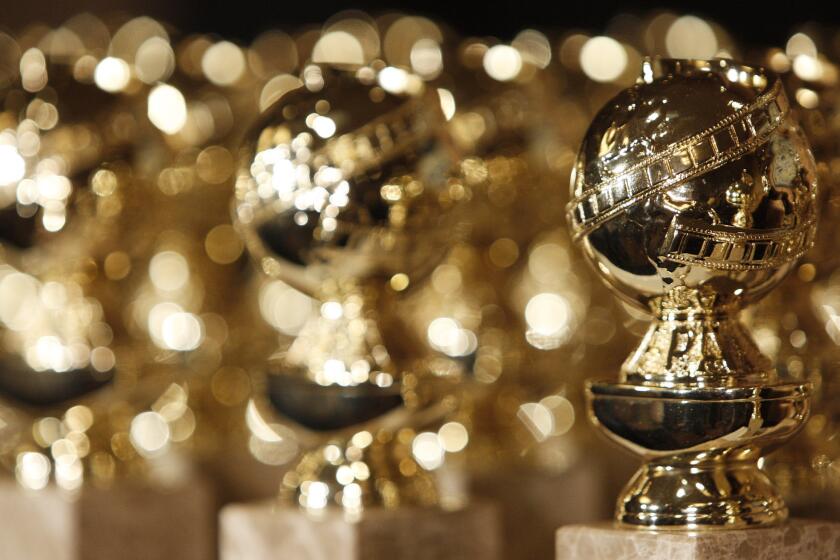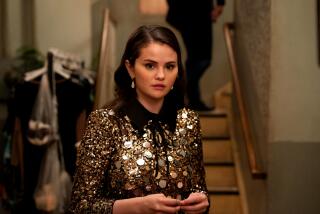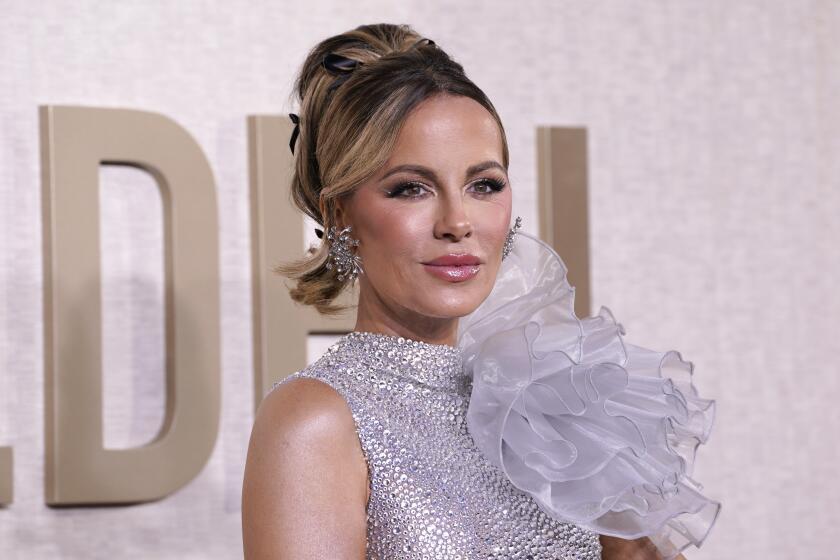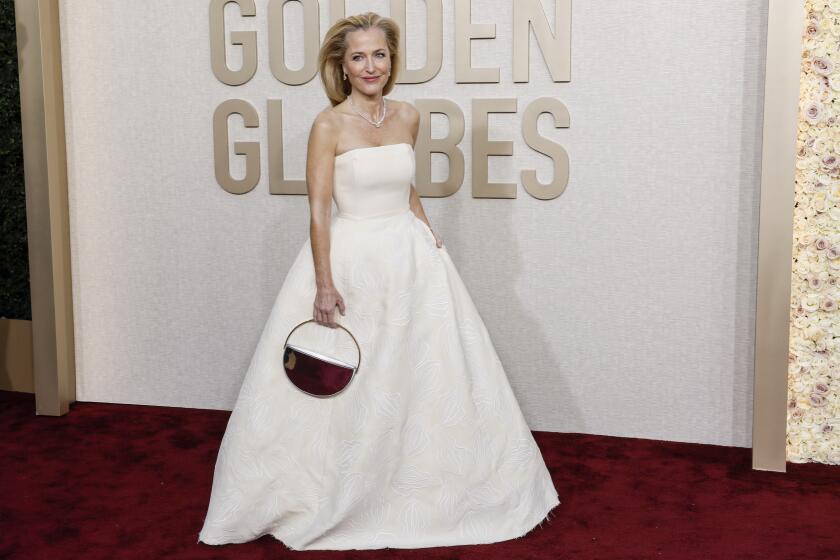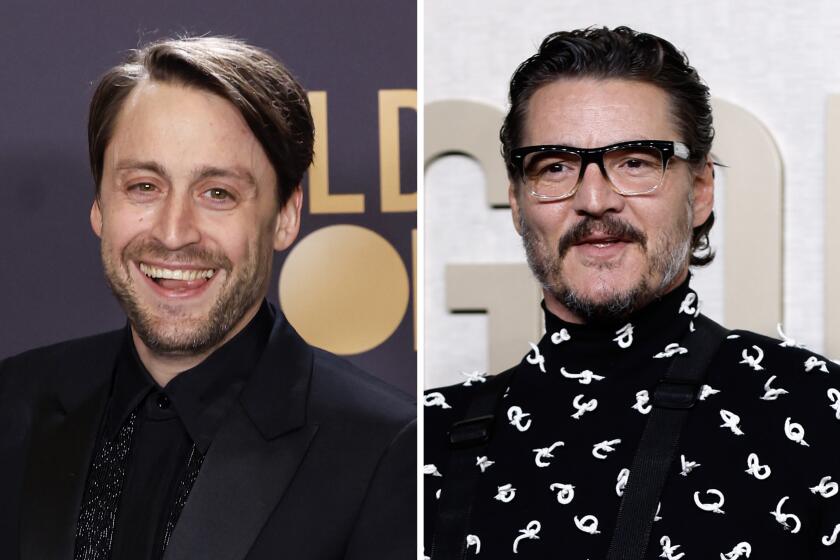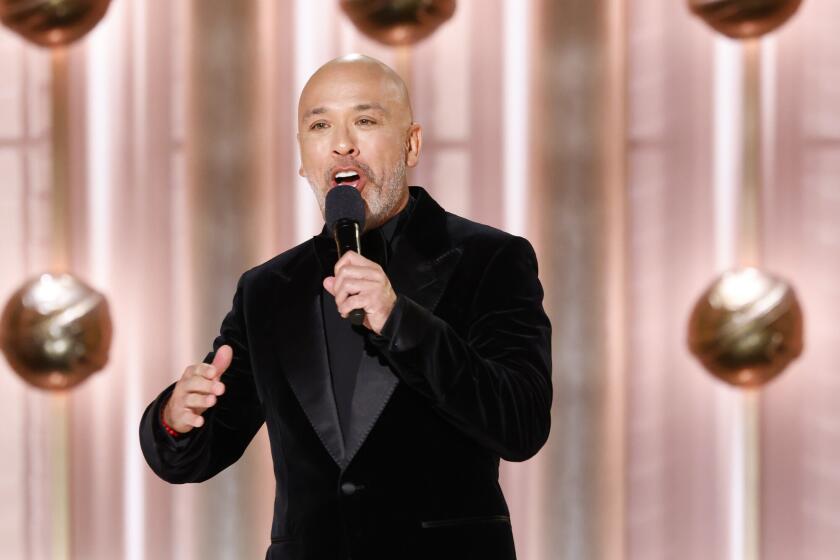Commentary: To kick off awards season, Golden Globes lean on buzz from a cultural powerhouse: TV
Here’s what Wednesday’s Golden Globe nominations tell us: Television delivered the blockbusters — and many of the conversation pieces — of 2020. Film, less so.
Television was long considered the lower form of entertainment, but the COVID-19 pandemic and its stay-at-home rules hastened TV’s challenge to film as the more vibrant and resonant medium. It took a decade or more of platform fragmentation and a boom of creative, daring and sometimes deeply flawed programming, but it’s safe to say that television is now the bolder, sexier, more glamorous medium than film. Just ask Nicole Kidman (nominated for “The Undoing”), Cate Blanchett (“Mrs. America”) and every other “movie” star who’s made the jump.
The flip has upended a generations-old hierarchy. Look no further than the Globes’ top categories.
Chances are you’ve watched drama series nominees “The Mandalorian,” “The Crown,” and/or “Ozark,” and you’ve at least heard of “Lovecraft Country.” (No matter if you missed “Ratched.” So did everyone else, except apparently the Hollywood Foreign Press Assn.)
With Wednesday’s announcement of the nominees for the 78th Golden Globes, the Hollywood Foreign Press Assn. marked the start of an awards season like no other.
Now consider nominees in the motion picture drama category: “The Father,” “Nomadland,” “Promising Young Woman,” “Mank” and “The Trial of the Chicago 7.” The first two on the list have yet to be released to the wider public. “Promising Young Woman” has attracted outsize attention for the discourse around it. And the two you’re likeliest to have seen were Netflix productions, appearing alongside everything else in the streamer’s catalog, from the whimsical (“Bridgerton”) to the serious (“Unorthodox”).
Not all of the motion picture musical/comedy nominees are quite as esoteric: “Hamilton” (Disney+), “The Prom” (Netflix) and “Borat Subsequent Moviefilm” (Amazon) were all streaming sensations. But Hulu’s “Palm Springs,” starring Andy Samberg and Cristin Milioti, is an offbeat two-hander with an existentialist streak, and “Music,” singer-songwriter Sia’s directorial debut — which has already attracted controversy for its depiction of autism — is also on the list of film nominees yet to be released.
Without the long buildup of a traditional awards season, with all eyes on festivals, fall releases and precursor awards, most of us are just now becoming aware of film titles like “The Father” (also nominated for drama actor Anthony Hopkins and supporting actress Olivia Colman) and “I Care a Lot” (nominated for comedy actress Rosamund Pike).
The comedy series category, on the other hand, was packed with some of TV’s buzziest shows: Emmy darling “Schitt’s Creek,” Hulu’s bawdy “The Great,” Netflix’s fluffy “Emily in Paris,” HBO Max’s irreverent whodunit “The Flight Attendant” and Apple TV+’s crowd-pleasing hit “Ted Lasso.” A crazy comedy mix for crazy times, each of which had its moment (or more) in the zeitgeist.
The ascent of TV to the top of the pop culture pecking order is due in part to the nimble nature of streamers. Simply put, they’ve churned out more content than traditional film studios and TV networks, and with a sharper eye for the country’s changing demographics and tastes. The Golden Globes are a barometer of that shift: Netflix amassed the most nominations among all contenders, split almost evenly between TV (20 nominations) and film (22), and other streamers — Amazon, Hulu, Apple TV+, HBO Max — also racked up multiple nominations apiece. By contrast, all of broadcast TV combined nabbed just one: comedy series actress Jane Levy, for NBC’s “Zoey’s Extraordinary Playlist.”
Viewers don’t and shouldn’t care what qualifies as a “motion picture” versus a made-for-TV movie or series anymore, if they ever did. Even from a creative perspective, the line is so blurred at this point that arguing such distinctions is useless. With most movie theaters closed for nearly a year now, all that content had to go somewhere. “Mank” director David Fincher might not have imagined one of his works premiering on the same platform, the same month, as “Teen Mom 2,” but that’s exactly where we are thanks to the weirdest year ever.
And if we’re honest, “The Queen’s Gambit,” which landed nominations for limited series and lead actress Anya Taylor-Joy, is really one long film chopped into seven episodes. Amazon’s limited series “Small Axe,” my personal favorite, is five small films banded together into a TV anthology. And Disney+ blockbuster “The Mandalorian” is a master class in how to condense gargantuan “Star Wars” productions into 50 or so riveting yet tidy minutes. We’ll see if Baby Yoda really does have the power to move things in his favor when the awards are handed out Feb. 28 in an NBC telecast hosted by veterans Tina Fey and Amy Poehler.
‘Promising Young Woman’ surprises. ‘Minari’ and four excellent Black-led ensembles snubbed. And more.
No matter the format, television is now doing what film used to, but better. It’s dazzling with star power, pushing the envelope and capturing the zeitgeist. HBO’s drama nominee “Lovecraft Country” paired sci-fi and horror with the civil rights movement and the fight against white supremacy. Comedy contender “The Flight Attendant” looked at alcoholism through a millennial lens — within the context of a wacky murder mystery, naturally — while nominated “Ramy” creator-star Ramy Youssef brought a similar generational sensibility to its daring depiction of a Muslim American millennial.
The Globe nominations reflect some of TV’s luminosity, of course, but with it comes the dull sheen. The Hollywood Foreign Press Assn. chose the pedestrian “Emily in Paris” over dozens of other sharp, topical and wildly creative comedies, not least Netflix’s “Never Have I Ever,” and entirely overlooked Michaela Coel’s stunning limited series “I May Destroy You,” which lost out to “Normal People,” “The Queen’s Gambit,” “Small Axe,” “The Undoing” and “Unorthodox.” Ryan Murphy’s flailing recent offerings, which include “Hollywood” and “Ratched,” were nominated, while fresher series, like “Dead to Me” and “The Boys,” were not. And Youssef, along with “Black Monday’s” Don Cheadle and “Small Axe’s” John Boyega, accounted for the total number of TV performance slots to go to people of color.
Performance nominations in the film categories were another story. Nods for lead actress in a drama included Viola Davis from “Ma Rainey’s Black Bottom” and Andra Day for “The United States vs. Billie Holiday,” while lead actors in a drama included Riz Ahmed for “Sound of Metal,” a posthumous nod for Chadwick Boseman in “Ma Rainey’s Black Bottom” and Tahar Rahim in “The Mauritanian.” Perhaps the bigger surprise, given the Globes’ track record, was the three women nominated in the director category: Emerald Fennell for “Promising Young Woman,” Chloé Zhao for “Nomadland” and Regina King for the civil-rights-era drama “One Night in Miami.”
But film, hobbled by the pandemic, had vanishingly few blockbusters to offer to the usually glitz-attracted Globes voters, with those that weren’t delayed entirely — “Wonder Woman 1984,” “Tenet” — making more of a soft imprint than a dent. And while the indie sensibility honored on the film side is well worth celebrating, it’s nice to see recognition for the cultural power that has made the small screen so big. Even if it’s to kick off Oscar season.
More to Read
The complete guide to home viewing
Get Screen Gab for everything about the TV shows and streaming movies everyone’s talking about.
You may occasionally receive promotional content from the Los Angeles Times.
